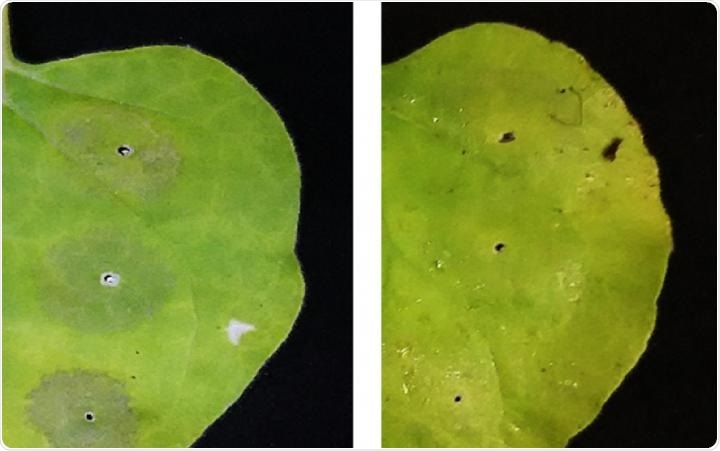The production of high-value pharmaceutical proteins in plants—at times referred to as molecular pharming—provides benefits over other manufacturing techniques, in particular the low cost and ease of upgrading protein production to meet demands.

A team at the University of Tsukuba has discovered that spraying plant leaves with high concentrations of the antioxidant ascorbic acid (vitamin C) can dramatically increase the yield of foreign proteins. Ascorbic acid prevents premature cell death in the leaf cells and reduces the breakdown of foreign proteins, such as antibodies. The new method should help improve the “molecular pharming” of many types of valuable proteins for research and medicine. Image Credit: University of Tsukuba.
However, when huge amounts of “foreign” proteins are expressed in plants, they can also occasionally lead to several issues, like premature cell death and dehydration in the plant leaves.
A research team, headed by Professor Kenji Miura from the University of Tsukuba, has now observed that protein production can be increased by three times or more by spraying leaves with high concentrations of antioxidant ascorbic acid or vitamin C. The team has recently reported their results in the Plant Physiology Journal.
The researchers worked with a close relative of tobacco called Nicotiana benthamiana, which is commonly used for this kind of application. This is because the plants grow optimally in greenhouses and it is also comparatively easy to add foreign genes.
The team induced the leaves to create new proteins through a process called agro-infiltration, in which the leaves are infected with bacteria, known as Agrobacterium, that carry the DNA, which encodes the target proteins into the plant cells. The leaf cells, in turn, decode the DNA and utilize it to produce new proteins.
Although a few foreign proteins cause some difficulties for plant cells, others can cause side-effects that appear to be induced by an abundance of harmful reactive oxygen species. These harmful effects can be offset by applying ascorbic acid as an antioxidant, leading to significantly higher rates of protein production.
We tested the method with several different types of proteins. We used green fluorescent protein (a common tool in the lab) and two human proteins, called Cul1 and an F-box protein. Spraying the leaves with ascorbic acid made a surprisingly big difference, but only when we applied high concentrations of the antioxidant. It seems that ascorbic acid prevents cell death and also reduces the breakdown of the foreign proteins, so the yield is higher.”
Kenji Miura, Professor, University of Tsukuba
The researchers were able to create both the light chain and heavy chain of an antibody protein. They demonstrated that chains formed in the plant leaves correctly assembled into a functional antibody (containing two light and two heavy chains) and ascorbic acid did not disrupt its immunological properties.
We are delighted by our results. As this method of spraying the leaves is so simple, we expect it can be widely adopted and should help to improve the production of many types of valuable proteins for research and medical applications.”
Kenji Miura, Professor, University of Tsukuba
Source:
Journal reference:
Nosaki, S., et al. (2021) Prevention of necrosis caused by transient expression in Nicotiana benthamiana by application of ascorbic acid. Plant Physiology. doi.org/10.1093/plphys/kiab102.